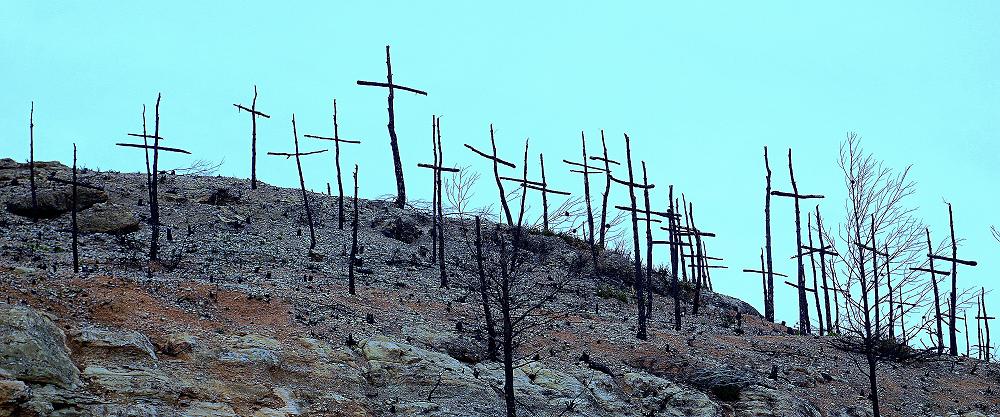
New Way of Being with Earth — Jeremiah 31:31-34
ELAINE WAINWRIGHT says that listening to the prophet Jeremiah 31:31-34 during Lent can bring us to a new relationship with Earth.
We hear the prophet Jeremiah in the reading for the Fifth Sunday of Lent — the Sunday just prior to Palm Sunday and entry into what we call Holy Week. It is intended to speak to the heart of our journey of conversion through the Lenten period into Easter.
An initial reading of Jeremiah’s text (Jer 31:31-34) draws readers into the intimate relationship between God and the human community. This is a relationship that has been broken in the past — broken by members of that community, individually and collectively. God, however, promises a restoration, a new covenant. The text breathes intimacy and right relations and our reading of it is familiar.
Listen to the New Voice
It would be easy for us, therefore, this Lent and Easter to rest in the familiar and to let words like “new covenant” invite us into minor changes in our lifestyle. But there is another voice that echoes through the words of Jeremiah at this time. It is that of Pope Francis who is calling for “a fresh analysis of our present situation” in the opening chapter of his 2015 encyclical, Laudato Si’ (par 17). Such an analysis uncovers a list of challenges: pollution and climate change; the issue of water; loss of biodiversity; decline in the quality of human life and the breakdown of society; global inequality; weak responses; and a variety of opinions (par 20-61). These form a new perspective from which and through which to read the biblical text (par 62-100).
This new perspective needs to be both global and local and our Jeremiah text suggests that it is characterised by urgency: the days are coming, says our God, when I will make a new covenant. The Lenten period is a time for examining our attitudes, our priorities, our way of seeing and being in our world.
Look at Where We Live
We are challenged to expand our perspectives so that we are not confined within a worldview that focuses only on the human and the holy. Laudato Si’ invites us to include habitat within not only our worldview but our way of being and acting on this planet Earth that we and all other earthlings/earth beings call home. Living into such a new understanding and lifestyle can be seen as the “new covenant” which God wants to make not just with the human community but also the other-than-human. How might such a shift in perspective shape our reading of the Jeremiah text?
Urgency Is with Us
We have already drawn attention to the note of urgency in the voice of God that echoes through Jer 31: 31. It finds expression in the phrase “the days are surely coming”. For the ecological reader this phrase captures the urgency with which ecological issues confront us. Water and waste are perhaps the most urgent globally. They call for individual responses but also what might be called a “covenanting” with others locally, regionally or globally to bring about a new response to the challenges that face us in relation to water and waste. Surely the days are coming when we make a new covenant between people and nations.
It will not be like the covenant of old. Indeed, no. We are in a new time and the issues facing us are monumental. They extend far beyond the confines of a God in relationship with a select segment of the human community.
Time for a New Covenant
A new covenant is called for. Each of us is invited into this moment, this new moment, in the unfolding of the interrelationships within the habitat-human-holy web. It will require very careful analysis of and attention to the ways in which relationships have broken down (how we, the human community, have broken the covenant, in the words of Jeremiah).
It will take us to the heart of our daily lives: how we use or abuse water, food, power and other Earth resources. It will also engage us in our local, regional and global communities who are seeking to attend to the challenges to Earth and our covenant with Earth.
For our new challenges, we need a new covenant. As far as we as a human community know, the planet has never before been so severely under threat. For those on the Lenten journey accompanied by texts such as that of Jeremiah 31:31-34, this does not have to lead us to despair. Rather the prophet can be heard providing assurance of a new future: “I will put my law within them, and I will write it on their hearts; and I will be their God, and they shall be my people.”
The “new law” that is needed at this time can be heard in the call of Pope Francis to “ecological conversion” (LS par 217). It is a call to be “protectors of God’s handiwork”, not as an optional extra but as essential to a “life of virtue” (par 217). It will entail “gratitude and graciousness, a recognition that the world is God’s loving gift”. It is also characterised by a “loving awareness that we are not disconnected from the rest of creatures but joined in a splendid universal communication” (par 220).
We, the human community, “are not disconnected ... but joined in a splendid universal communication”. Bringing to our biblical text the lens not only of the human and the holy but also of habitat, invites and challenges us to conversion during Lent — to a new way of being on this planet Earth.
Tui Motu Magazine. Issue 224, March 2018: 24-25.
